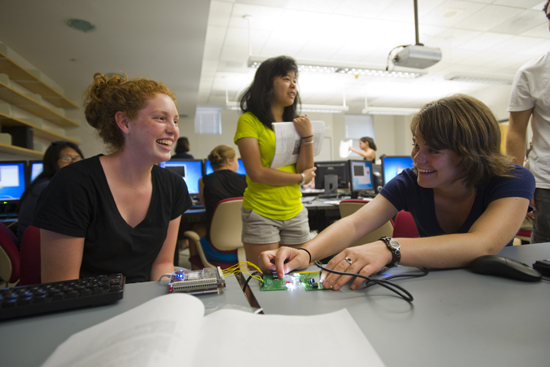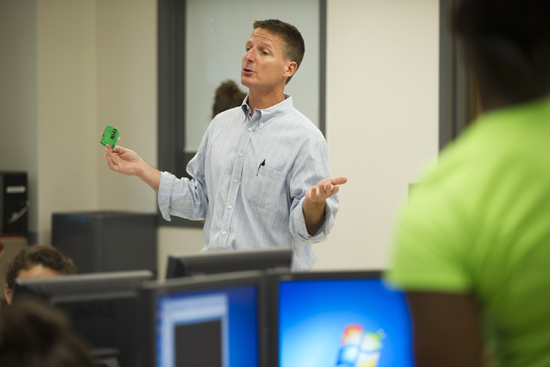Recruiting Tomorrow’s Women Scientists
Summer Pathways opens doors for female high school students

Summer Pathways students Kristen Copley (left) and Jacquie Claveau hook up their visible light transceivers during a session with Tom Little, the associate director of the National Science Foundation Smart Lighting Engineering Research Center and a professor of electrical and computer engineering in the College of Engineering. Emily Lam (ENG’14) is on hand to help. Photos by Cydney Scott
Knowing that text messaging is teenagers’ preferred mode of communication, Tom Little capitalized on that recently to show how BU’s research into smart lighting technology could one day be used to send text messages and other data faster, cheaper, and more securely. His audience? A room full of 11th- and 12th-grade women from area high schools.
Little, the associate director of the National Science Foundation Smart Lighting Engineering Research Center and a professor of electrical and computer engineering in the College of Engineering, was leading one of the two dozen workshops taught during Summer Pathways, a week-long intensive program held at BU this month for 20 young women with an interest in the fields of science, technology, engineering, and math (STEM).
“What you guys have done today is taken a bag of parts to create a transceiver used in optical wireless communications,” Little said, standing at the front of the classroom as the young women looked on. “Throughout this two-hour lab, you’ve created devices that cost very little to produce and make use of light waves instead of radio waves to enable digital transmission, like text messages.”
During their week on campus, the Summer Pathways students visited labs, heard talks from guest speakers, and had opportunities to interact with BU undergraduates, grad students, and faculty from numerous disciplines. Field trips included visits to the Broad Institute and Google’s offices in Kendall Square. The young women also received career and college admissions advice and got a taste of dorm life by living in Warren Towers. The week ended with the students delivering a presentation about what they’d learned to their families and friends.
Summer Pathways was cofounded six years ago by Cynthia Brossman, the founder and administrative director of BU’s Learning Resource Network (LERNet) and Elise Morgan, a College of Engineering associate professor of mechanical engineering and of biomedical engineering. The idea for the program evolved from two annual day-long events that had been in place from 1994 to 2003.
For Brossman—who recently received the John S. Perkins Distinguished Service Award for more than two decades of dedication to BU—Summer Pathways is one of the ways she encourages underrepresented students, especially women, to pursue careers in STEM fields. A 2011 report by the U.S. Department of Commerce found that while women fill nearly half of all jobs in the country, they hold fewer than 25 percent of jobs in STEM-related fields. That same report noted that women have seen no employment growth in STEM jobs since 2000. Currently, only one out of every seven engineers is a woman.
In addition to improving those statistics, Brossman hopes to push the young women who attend Summer Pathways into fields they didn’t even know existed by exposing them to areas of science and technology most high school students never get to experience. “Many times young women who come to Summer Pathways have an idea that they want to do something with science, but think the only way to do that is to become a medical doctor,” says Brossman. “We want to show them there are so many other fields out there that they can consider.”

During the lesson with Little (above), the young women huddled in groups of two in a Photonics Center lab to create visible light transceivers. Starting with an empty printed circuit board, they soldered on components like LED lights, resistors, and a small photodiode, which would later enable the LED to pulse on and off rapidly—too fast for the human eye to see—to transmit information to, and receive it from, other enabled devices.
As they soldered the pieces onto the circuit boards, smoke plumes rose from their soldering irons. “I’ve seen people solder art and jewelry before, but never like this,” said 16-year-old Erin Hickey, who is considering pursuing a career in medicine as a general practitioner one day. Standing next to her was Jonathan Bell (ENG’14), who was on hand to help. “In a lab here at BU, there is a team soldering boards that are two feet across,” he told her. Nearby, Emily Lam (ENG’14) recommended that the young women occasionally touch their soldering irons to a damp sponge to keep them clean, and occasionally looked over a young woman’s shoulder to double-check her work.
Once the visible light transceivers had been built, the Summer Pathways group carried the green boards down the hall to a computer lab. Working in pairs, each young woman plugged a transceiver into an adjacent computer. After connecting their transceivers to computers using a special file transfer application known as PuTTY and a USB cable, the boards “spoke” to one another and carried a message that allowed the Summer Pathways students to experience wireless optical texting.

Other stops during the week included visits to Kim McCall’s and Joyce Wong’s labs. McCall, a College of Arts & Sciences associate professor of biology, engaged students in her work of studying programmed cell death in the ovaries of the fruit fly Drosophila melanogaster by inviting them to extract the flies’ ovaries and stain them. Wong, an ENG professor of biomedical engineering, had her BU students lead the Summer Pathways students through a series of experiments that taught about microfluidics.
Among the Summer Pathways students were Brooke Pierce and Nicole Clancy, who frequently found themselves partnered during the week. For Pierce, the visit to Google proved a highlight. “They showed us the inner workings of their patent-searching feature,” the incoming high school junior from Carver High School said. “I was really impressed by the work ethic there.” Prior to arriving at BU for the program, Pierce thought she wanted to be an engineer, but after a visit to BU’s Cognitive Neuroimaging Laboratory, part of BU’s Center for Memory & Brain, she says she now wants to learn more about neuroscience.
Clancy, a 17-year-old from Braintree High School, says that while she is leaning toward studying chemical engineering, she hasn’t ruled out biology. “I’ve liked this week because it’s given us a wealth of information on different futures,” she said. “I’m glad I came here because it’s a lot of stuff jam-packed into a week.”

Comments & Discussion
Boston University moderates comments to facilitate an informed, substantive, civil conversation. Abusive, profane, self-promotional, misleading, incoherent or off-topic comments will be rejected. Moderators are staffed during regular business hours (EST) and can only accept comments written in English. Statistics or facts must include a citation or a link to the citation.